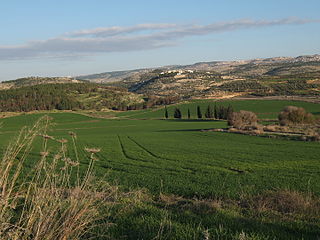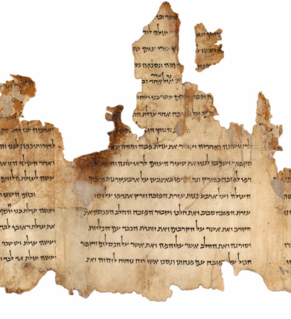
In the Hebrew Bible, Hosea, son of Beeri, was an 8th-century BC prophet in Israel who authored the book of prophecies bearing his name. He is one of the Twelve Prophets of the Jewish Hebrew Bible, also known as the Minor Prophets of the Christian Old Testament. Hosea is often seen as a "prophet of doom", but underneath his message of destruction is a promise of restoration. The Talmud claims that he was the greatest prophet of his generation. The period of Hosea's ministry extended to some sixty years and he was the only prophet of Israel of his time who left any written prophecy.
The Israeli Declaration of Independence, formally the Declaration of the Establishment of the State of Israel, was proclaimed on 14 May 1948 by David Ben-Gurion, the Executive Head of the World Zionist Organization, Chairman of the Jewish Agency for Palestine, and soon to be first Prime Minister of Israel. It declared the establishment of a Jewish state in Eretz-Israel, to be known as the State of Israel, which would come into effect on termination of the British Mandate at midnight that day. The event is celebrated annually in Israel with a national holiday Independence Day on 5 Iyar of every year according to the Hebrew calendar.

Lehi, often known pejoratively as the Stern Gang, was a Zionist paramilitary organization founded by Avraham ("Yair") Stern in Mandatory Palestine. Its avowed aim was to evict the British authorities from Palestine by resort to force, allowing unrestricted immigration of Jews and the formation of a Jewish state, a "new totalitarian Hebrew republic". It was initially called the National Military Organization in Israel, upon being founded in August 1940, but was renamed Lehi one month later. According to Jean E. Rosenfeld, the group admitted to having used terrorist attacks.

Zionism is the national movement of the Jewish people that supports the re-establishment of a Jewish homeland in the territory defined as the historic Land of Israel. Modern Zionism emerged in the late 19th century in Central and Eastern Europe as a national revival movement, both in reaction to newer waves of antisemitism and as an imitative response to other nationalist movements. Soon after this, most leaders of the movement associated the main goal with creating the desired state in Palestine, then an area controlled by the Ottoman Empire.

Haaretz is an Israeli newspaper. It was founded in 1918, making it the longest running newspaper currently in print in Israel, and is now published in both Hebrew and English in the Berliner format. The English edition is published and sold together with the International New York Times. Both Hebrew and English editions can be read on the Internet. In North America, it is published as a weekly newspaper, combining articles from the Friday edition with a roundup from the rest of the week.
Gush Emunim was an Israeli Orthodox Jewish, messianic, right-wing activist movement committed to establishing Jewish settlements in the West Bank, the Gaza Strip, and the Golan Heights. While not formally established as an organization until 1974 in the wake of the Yom Kippur War, Gush Emunim sprang out of the conquests of the Six-Day War in 1967, encouraging Jewish settlement of the land based on the belief that, according to the Torah, God gave it to the Jewish people. While Gush Emunim no longer exists officially, vestiges of its influence remain in Israeli society.

Aliyah is the immigration of Jews from the diaspora to the Land of Israel. Also defined as "the act of going up"—that is, towards Jerusalem—"making Aliyah" by moving to the Land of Israel is one of the most basic tenets of Zionism. The opposite action, emigration from the Land of Israel, is referred to in Hebrew as yerida ("descent"). The State of Israel's Law of Return gives Jews and their descendants automatic rights regarding residency and Israeli citizenship.

New antisemitism is the concept that a new form of antisemitism has developed in the late 20th and early 21st centuries, tending to manifest itself as opposition to Zionism and criticism of the Israeli government. The concept is included in some definitions of antisemitism, such as the Working Definition of Antisemitism and the 3D test of antisemitism.

The Ten Commandments, also known as the Decalogue, are a set of biblical principles relating to ethics and worship, which play a fundamental role in Judaism and Christianity. The commandments include instructions to worship only God, to honour one's parents, and to keep the sabbath day holy, as well as prohibitions against idolatry, blasphemy, murder, adultery, theft, dishonesty, and coveting. Different religious groups follow different traditions for interpreting and numbering them.

Kadima was a centrist and liberal political party in Israel. It was established on 24 November 2005 by moderates from Likud largely to support the issue of Ariel Sharon's unilateral disengagement plan, and was soon joined by like-minded Labor politicians.
Labour Friends of Israel (LFI) is a group in the Parliament of the United Kingdom that promotes support for a strong bilateral relationship between Britain and Israel, and seeks to strengthen ties between the British Labour Party and the Israeli Labor Party. LFI supports a two-state solution to the Israeli–Palestinian conflict, with Israel recognised and secure within its borders, and the establishment of a viable Palestinian state. As of August 2018 it includes about 80 Labour MPs.
Conservative Friends of Israel (CFI) is a British parliamentary group affiliated to the Conservative Party, which is dedicated to strengthening business, cultural and political ties between the United Kingdom and Israel. CFI is an unincorporated association. It also seeks to strengthen ties between the British Conservative Party and the Israeli Likud party.
Neo-Zionism is a right-wing, nationalistic and religious ideology that appeared in Israel following the Six-Day War in 1967 and the capture of the West Bank and Gaza Strip. Neo-Zionists consider these lands part of Israel and advocate their settlement by Israeli Jews. Some advocate the transfer of Arabs not only from these areas but also from within the Green Line.
The relationship between Judaism and politics is a historically complex subject, and has evolved over time concurrently with both changes within Jewish society and religious practice, and changes in the secular societies in which Jews live. In particular, Jewish political thought can be split into four major eras: biblical, rabbinic, medieval, and modern.

The Assyrian captivity is the period in the history of Ancient Israel and Judah during which several thousand Israelites of ancient Samaria were resettled as captives by Assyria. This is one of the many instances of forcible relocations implemented by the Neo-Assyrian Empire. The Northern Kingdom of Israel was conquered by the Neo-Assyrian monarchs, Tiglath-Pileser III (Pul) and Shalmaneser V. The later Assyrian rulers Sargon II and his son and successor, Sennacherib, were responsible for finishing the twenty-year demise of Israel's northern ten-tribe kingdom, although they did not overtake the Southern Kingdom. Jerusalem was besieged, but not taken. The tribes forcibly resettled by Assyria later became known as the Ten Lost Tribes.

The Land of Israel is the traditional Jewish name for an area of indefinite geographical extension in the Southern Levant. Related biblical, religious and historical English terms include the Land of Canaan, the Promised Land, the Holy Land, and Palestine. The definitions of the limits of this territory vary between passages in the Hebrew Bible, with specific mentions in Genesis 15, Exodus 23, Numbers 34 and Ezekiel 47. Nine times elsewhere in the Bible, the settled land is referred as "from Dan to Beersheba", and three times it is referred as "from the entrance of Hamath unto the brook of Egypt”.
The Jewish left consists of Jews who identify with, or support, left-wing or liberal causes, consciously as Jews, either as individuals or through organizations. There is no one organization or movement which constitutes the Jewish left, however. Jews have been major forces in the history of the labor movement, the settlement house movement, the women's rights movement, anti-racist work, and anti-fascist and anti-capitalist organizations of many forms in Europe, the United States and modern-day Israel. Jews have a rich history of involvement in anarchism, socialism, Marxism, and Western liberalism. Although the expression "on the left" covers a range of politics, many well-known figures "on the left" have been of Jews who were born into Jewish families and have various degrees of connection to Jewish communities, Jewish culture, Jewish tradition, or the Jewish religion in its many variants.
Politics in Israel is dominated by Zionist parties. They traditionally fall into three camps, the first two being the largest: Labor Zionism, Revisionist Zionism (conservative) and Religious Zionism. There are also several non-Zionist Orthodox religious parties, non-Zionist left-wing groups as well as non-Zionist and anti-Zionist Israeli Arab parties.
Labor Zionism or socialist Zionism is the left-wing of the Zionist movement. For many years, it was the most significant tendency among Zionists and Zionist organizations. It saw itself as the Zionist sector of the historic Jewish labor movements of Eastern and Central Europe, eventually developing local units in most countries with sizable Jewish populations. Unlike the "political Zionist" tendency founded by Theodor Herzl and advocated by Chaim Weizmann, Labor Zionists did not believe that a Jewish state would be created simply by appealing to the international community or to a powerful nation such as Britain, Germany or the Ottoman Empire. Rather, Labor Zionists believed that a Jewish state could only be created through the efforts of the Jewish working class settling in Palestine and constructing a state through the creation of a progressive Jewish society with rural kibbutzim and moshavim and an urban Jewish proletariat.

Meretz is a left-wing, social-democratic and green political party in Israel.

















